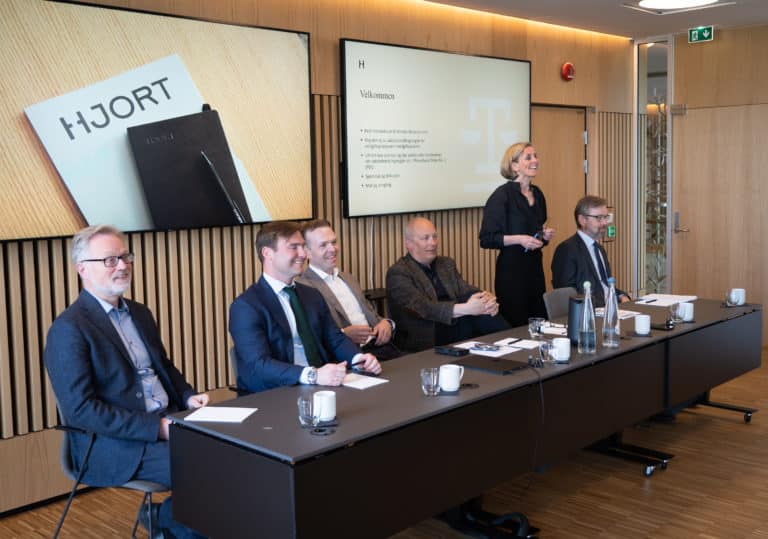468
Number of registered Court Cases in 2023
Litigation and dispute resolution are central practices at Hjort. The firm has been recognized as a leading litigation firm since its establishment in 1893, and over the years, it has litigated numerous pivotal cases that have set precedents for legal development.
We represent both companies and individuals, and each year we handle several hundred cases for the district courts, courts of appeal, and the Supreme Court. 12 of our lawyers have the right to appear before the Supreme Court, and the firm is highly ranked in litigation by internationally recognized ranking agencies such as Chambers & Partners and The Legal 500.

In addition to dispute resolution for the ordinary courts, Hjort has extensive experience with arbitration. Arbitration is a flexible dispute resolution mechanism, where the parties themselves appoint the members of the court, and it can be agreed that the case shall be exempt from public disclosure.
We have represented many of Norway’s largest companies in extensive arbitration cases. Several of the firm’s lawyers are also regularly appointed as arbitrators.

468
Number of registered Court Cases in 2023
282
Number of Registered Court Cases up to June 2024
The Investa Case
A major board liability case concerning the responsibility of board members and auditors for alleged insufficient and misleading information about the financial situation in the investment company Investa AS. Over 100 deposit creditors filed a lawsuit. The board and auditor were acquitted and awarded full legal costs for both the district court and the court of appeals. The case was denied advancement to the Supreme Court.
Attorney Else Bugge Fougner represented one of the board members with Kristin Veierød as legal assistant.
The Birth Control Pill Verdict
A lawsuit against the manufacturer of a birth control pill by the relatives of a woman who died from a heart disease. The issue was whether the cause of the woman’s death was due to a side effect of using the birth control pill. The district court and the court of appeals found that the woman’s death was causally related to her use of birth control pills. The district court concluded that there was also a basis for liability and awarded compensation of NOK 150,000. The court of appeals found that there was no basis for liability, neither in the form of negligent misinformation nor on an objective basis. The Supreme Court held that the cumulative weight of doubt must be considered when determining whether a causal connection exists.
The Supreme Court did not find that there was any reasonable probability that could justify the claim for compensation against the birth control pill manufacturer. Supreme Court Attorney Johan Hjort represented the manufacturer.
The Gardermoen Case
The case involved claims from residents in the area around Oslo Airport Gardermoen for compensation due to noise disturbances resulting from the establishment of a new main airport. Frode A. Innjord represented the residents of the area near the airport. The main issue in the case was whether the noise disturbances exceeded the tolerance limit set by the Neighbours Act who had settled in the area after the airport at Gardermoen was established. Oslo Airport (OSL) argued that modern airplanes were less noisy than the planes that had previously operated at Gardermoen, and that the average noise level was therefore reduced compared to before, even though the number of flights had increased. In a principled and thorough judgment, the Supreme Court held that one could not only look at the average noise level, but that the number of disturbing noise events also mattered. It was also emphasized that the general trend towards quieter aircraft meant that the neighbors would have experienced significantly lower noise levels if the main airport had not been established, and that such a general and foreseeable development should be the basis for assessing whether the neighborhood law’s tolerance limit was exceeded. On this basis, all residents of the area were awarded compensation. There are many judgments about airport noise, but the Gardermoen judgment is the only example where the Supreme Court has awarded compensation for increased noise nuisances to neighbors who have settled near an existing airport.
The Case of the Norwegian Church Endowment (OVF)
Supreme Court in Plenum
Hjort litigated the constitutionally significant case regarding the constitutional protection of the Norwegian Church Endowment (“OVF”) in 2010. The church estate included several parsonages, over 10,000 leasehold plots, and significant securities. Hjortpartners Anne Marie Due, acting as lead lawyer and Frode A. Innjord represented the Church of Norway. The case concerned whether a directive issued by the government regarding the redemption and regulation of leasehold plots in state and state-controlled enterprises could be applied to OVF. If so, the directive meant that the leasehold plots of the OVF were to be redeemed and the lease fees regulated to more favorable terms than those stipulated by the Leasehold Act. The central question for the district court and the Supreme Court was whether the directive was in conflict with the Constitution § 106, which at the time stated that purchase sums and revenues from the beneficed property should only be “used for the benefit of the Clergy and the promotion of Enlightenment” or that the fund should benefit the Church of Norway. The majority of the Supreme Court concluded that the directive required the fund to safeguard societal and private interests in a manner that entailed a systematic and significant reduction of the fund’s assets, and therefore, the directive was not compatible with the Constitution § 106. The government’s directive was declared invalid insofar as it required the OVF to regulate lease fees and redeem leasehold plots under the terms specified in the directive.
The case was initially handled by the Oslo District Court, which also found the directive invalid against the OVF. The Supreme Court’s Appeals Selection Committee consented to the appeal being brought directly before the Supreme Court, which heard the appeal case in plenum.
The Nesseby Case
Supreme Court in Plenum
In 2018, Hjortpartners Kristin Bjella and Frode A. Innjord, litigated a case before the Supreme Court in plenum, which concerned the interpretation of the Finnmark Act and ILO Convention No. 169, see HR-2018-456-P. The case involved a village community in Nesseby municipality in Finnmark, which undisputedly had extensive usage rights based on age-old use in a significant part of the municipality. The village community asserted that they, and not the Finnmark Estate, had the right to manage the renewable natural resources to which the usage rights were attached.
Contrary to the Finnmark Land Tribunal, the Supreme Court concluded that the local population had not exercised their usage rights in such a way that rights to manage the natural resources had been established through age-old use. This meant that the management authority granted to the Finnmark Estate as the landowner under the provisions of Chapter 3 of the Finnmark Act remained intact. Neither ILO Convention No. 169 nor other international legal rules could lead to a different result. The Finnmark Estate, represented by Hjort, was acquitted as far as the land tribunal’s judgment was appealed.
The TGS Case
Christian B. Hjort and former Hjort attorney Linn Eckhoff Dolva assisted TGS Nopec Geophysical Company ASA in a comprehensive case concerning allegations of complicity in tax fraud amounting to approximately 400 million Norwegian kroner under the exploration refund scheme. The defense team also included attorneys Henning Harborg, Ståle Kristiansen, and Hedda Rysst from Thommessen. The case spanned over four years. After a conviction in the district court, TGS was ultimately acquitted by the Borgarting Court of Appeal in its verdict dated April 16, 2020. The case was very extensive and raised numerous complex factual and legal issues.
Unequal Division of Shared Values
In September 2020, Hjort succeeded in the Supreme Court in a case concerning the burden of proof for the unequal division of values in a business enterprise. The Supreme Court discussed, among other things, whether the shareholder spouse must take out a market-rate salary for the work performed as an employee in the joint-stock company during the marriage. The Supreme Court also commented on the general burden of proof in cases of unequal division.
Karasjok case
On May 31st, 2024, the Grand Chamber of the Supreme Court handed down a judgment in the so-called Karasjok case (HR-2024-982-S). The Supreme Court acquitted Finnmarkseiendommen (FeFo) of the local population’s claim to ownership of the unsold land in the municipality. This involves an area of approximately 5361 square kilometers, representing 98.3% of the municipality’s total area. FeFo has been assisted by lawyers Frode A. Innjord and Rune Mykkeltvedt.
Limitation of claims for late enrollment in an occupational pension scheme
Hjort assisted Tromsøysund parish in a case concerning the question of whether a claim for supplementary enrollment in an occupational pension scheme is time-barred under the Limitation Act. The Supreme Court ruled that the claim for payment of pension premiums, which would be a consequence of post-registration, was a claim subject to limitation (HR-2023-1637-A).